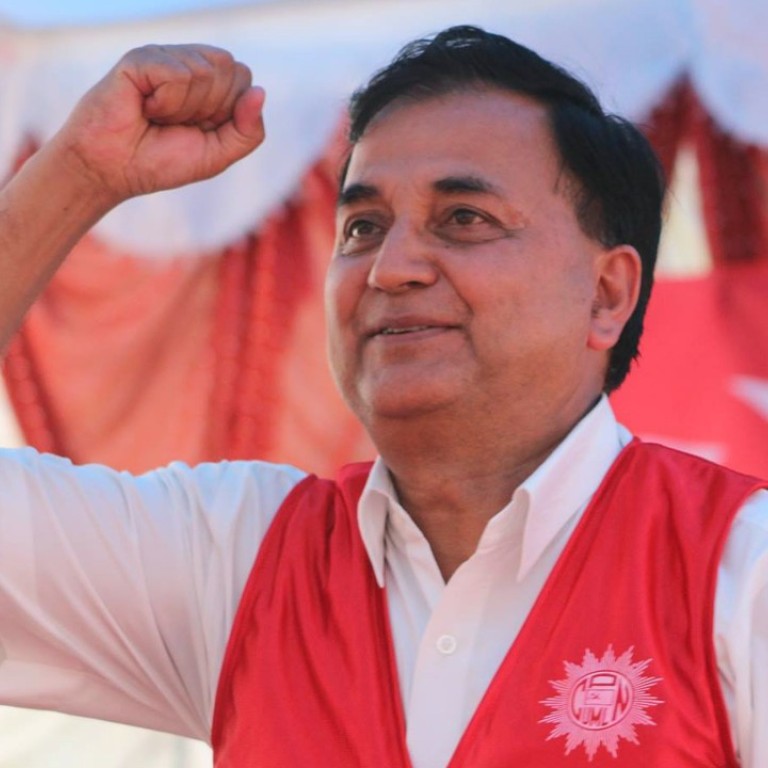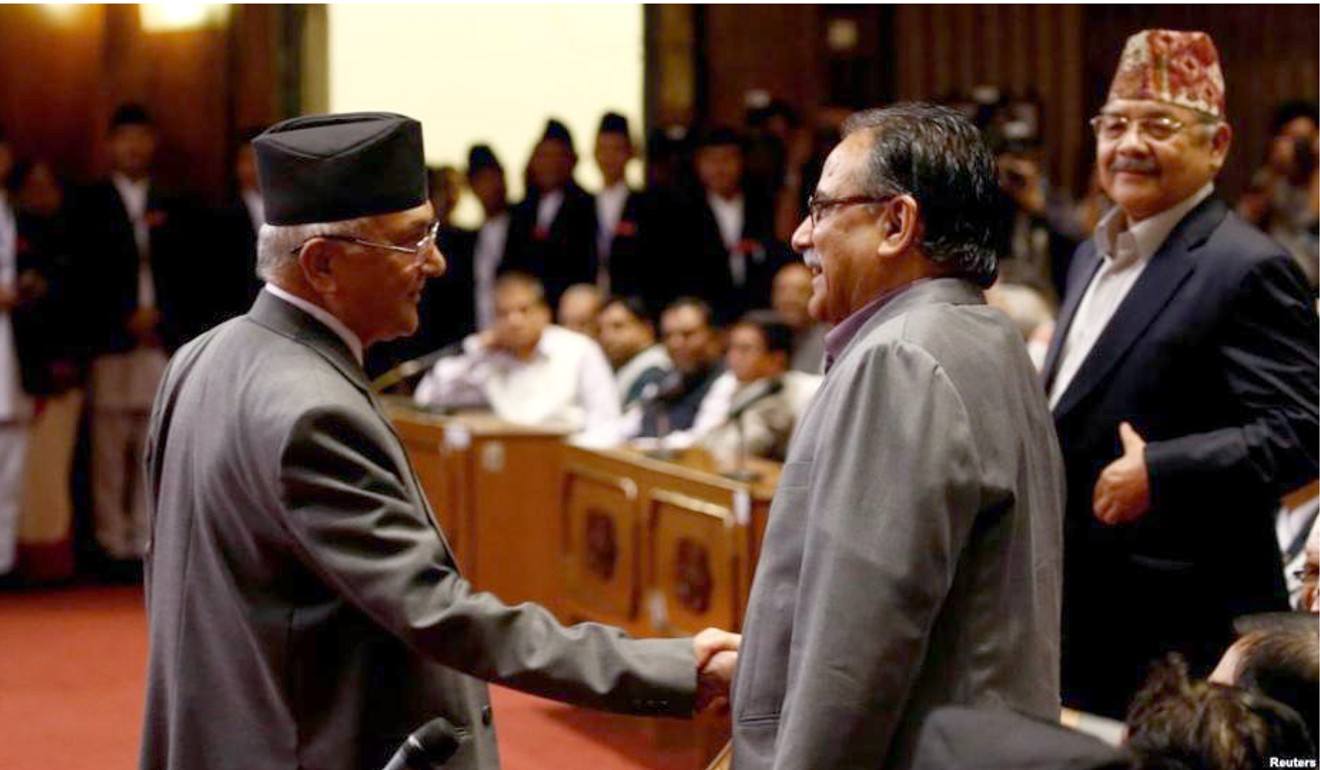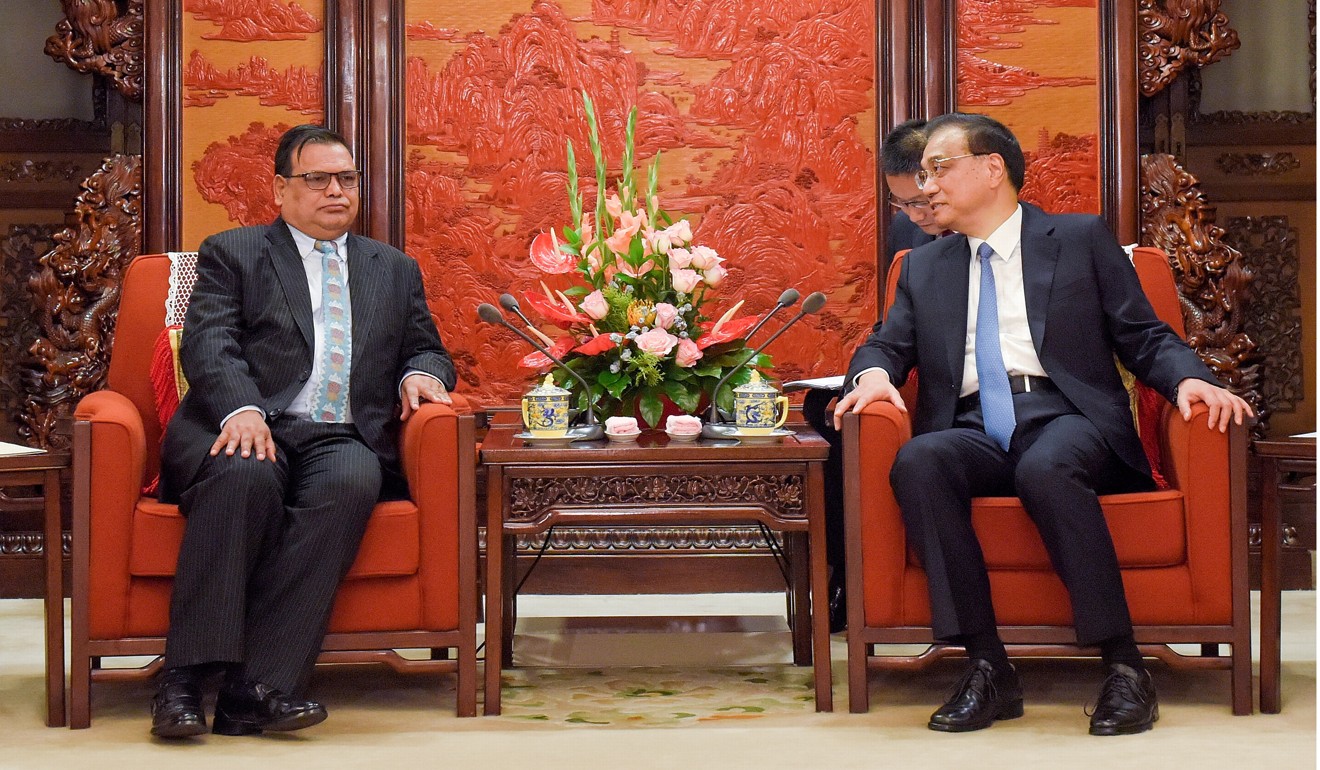
Could Nepal’s new communist alliance lead to closer ties with China?
Political allegiances may suggest an ideological shift towards Beijing, but analysts say Kathmandu remains India’s ally
The creation of an alliance of communist parties in Nepal ahead of the upcoming provincial and national elections could lead to closer ties between Kathmandu and Beijing, observers said.
The political reshuffle began on October 3, when the Communist Party of Nepal (Unified Marxist- Leninist) and the Communist Party of Nepal (Maoist Centre) – two of the country’s biggest parties – agreed, along with the smaller Naya Shakti party, to form a single communist bloc, which its leaders called a “historic necessity solely in the interest of Nepal and its people”.
The move saw the Maoists breaking away from an existing alliance with the Nepali Congress, the current ruling party under Prime Minister Sher Bahadur Deuba. In response, the Nepali Congress on October 5 amassed a right-wing coalition of parties in a “democratic alliance”.
The newly allied communist parties all had a “really good relationship with China”, which could give Beijing more room to engage with Kathmandu, which in turn would be a setback for India, Nepal’s traditional ally, said Pramod Jaiswal, a visiting research fellow at the New Delhi-based think tank Institution of Peace and Conflict Studies.
“Everything that’s happening ... all the political developments in Nepal are always connected to India and China,” he said. “On economic issues, [the communist parties] feel that China can give them more.”

Other observers have said the political shifts reflect both the less-than-ideal results for the CPN (UML) and Maoist Centre in the local elections held earlier in the year, and Nepal’s wider balancing act between India and China. Kathmandu has consistently sought to appease its two large neighbours, mostly recently by adopting a neutral stance during the tense Sino-Indian border stand-off in the Himalayas.
However, the shifts also inject fresh uncertainty into Nepal ahead of the provincial elections on November 26 and federal poll on December 5. Political instability has already seen four prime ministers come and go since the country adopted a new constitution in September 2015, after transitioning from a constitutional monarchy to a republic in 2008.
Ishwar Pokhrel, general secretary of the CPN (UML) party, said the new communist alliance would bring “like-minded political forces into the same boat” and help them to achieve a comfortable majority in the upcoming elections.

Prakash Sharan Mahat a member of the Nepali Congress’ central working committee, described the Maoists’ decision to end their partnership with his party as a surprise.
“We thought that this alliance should have continued, but unfortunately, I don’t know for what reason it did not,” he said. “We will fight on our own.”
Pradeep Bashyal, executive director of Bishweshwar Prasad Koirala School of Public Policy, said the formation of the new communist alliance – something leftist forces have been pushing for since 2006 – was part of the “diplomatic tug of war between India and China”.
It could certainly be a boon for Beijing, as the three parties are seen as being more in tune with communist-ruled China, and not only because of their ideological alignment.
In March last year, in the middle of his nine-month tenure as prime minister, CPN (UML) chairman KP Sharma Oli signed a historic trade and transit agreement with Beijing for a rail link between China and Nepal through Tibet, cutting Nepal’s reliance on India. He was ousted that August by Maoist Centre chairman Pushpa Kamal Dahal “Prachanda” – in a move many saw as being initiated by New Delhi – who in turn went on to give Nepal’s endorsement for China’s wide-ranging trade plan, known as the “Belt and Road Initiative”.
“Oli is known as a pro-Chinese leader and Maoist chairman [Prachanda] was also once a great friend of China, but [because of New Delhi’s alleged role in his election] he is struggling to win back its trust,” Bashyal said.
China has increased its economic and political influence in Nepal in recent years. In May, Beijing provided Kathmandu with US$1 million for its local elections – the first local polls since the adoption of the new constitution. It has invested heavily in infrastructure and energy projects – mostly through the belt and road plan – and also provided humanitarian aid in the aftermath of the devastating 2015 earthquake in Nepal.
“China has a very positive image in Nepal,” said Bipin Adhikari, a constitutional law expert at Kathmandu University. “China is very clear that it is for an independent Nepal that can decide [what to do for] itself.”
Nonetheless, India has deep historical, socioeconomic and cultural ties with Nepal, as the two nations share an open border and their top officials have close ties. However, anti-Indian sentiment in Nepal rose as a result of New Delhi’s perceived interference in local affairs and its role in the months-long border blockade in 2015.
“India’s political role is much more overt,” said Mahendra Lawoti, an expert in Nepalese politics at Western Michigan University in the United States.
“In fact, it is a two-way street. It is not only that India wants to interfere, but often times the political leadership in Nepal wants India’s blessing.”
Despite their ideological bias towards China, Nepal’s communist parties are well aware of the need to maintain a good relationship with India, something Beijing recognises as well.
“Both [CPN (UML) and the Maoist Centre] understand that in Nepal, India matters,” Lawoti said. “India can break governments, India can create difficulties.”
And although New Delhi was wary of China’s growing presence in Nepal, it was still confident it could compete with Beijing, Jaiswal said.
“India has learned to accommodate China in South Asia because now China is a big power,” he said.
Xu Liping, an expert on Southeast Asia studies at the Chinese Academy of Social Sciences, said China and Nepal were friendly neighbours, whose partnership bode no ill for India.
“In Nepal, China and India do not exist in a you-lose-I-win, zero-sum game,” he said. “There should be a partnership between all three nations to jointly safeguard peace and stability in South Asia.”
Party leaders echoed that sentiment. Pokhrel of the CPN (UML) said the creation of a single communist party did not necessarily reflect increased engagement with China or a rise in anti-Indian sentiment.
“We are pro-Nepal,” he said. “We always appreciate the positive concern shown and general support accorded by our two immediate neighbours in [the] socioeconomic and political development of Nepal.”
Nepali Congress politician Mahat said he did not want to see parties in Nepal divided by their alignments with India or China.
“The Nepali Congress believes in having good relations with both countries,” he said. “We want to respect the sensitivities of China and India. At the same time, we’d like them to respect the sensitivities of Nepal.”
While Nepal’s political future remains unclear, analysts said the new alliances – if they survive past the elections – could provide greater stability through a near two-party system along ideological lines. The only thing that was clear, they said, was that China and India would be watching the elections closely.
“Both of them will be watching very closely because it will have an impact on relations between Nepal and China, Nepal and India,” Jaiswal said. “It’ll be very interesting for sure.”

